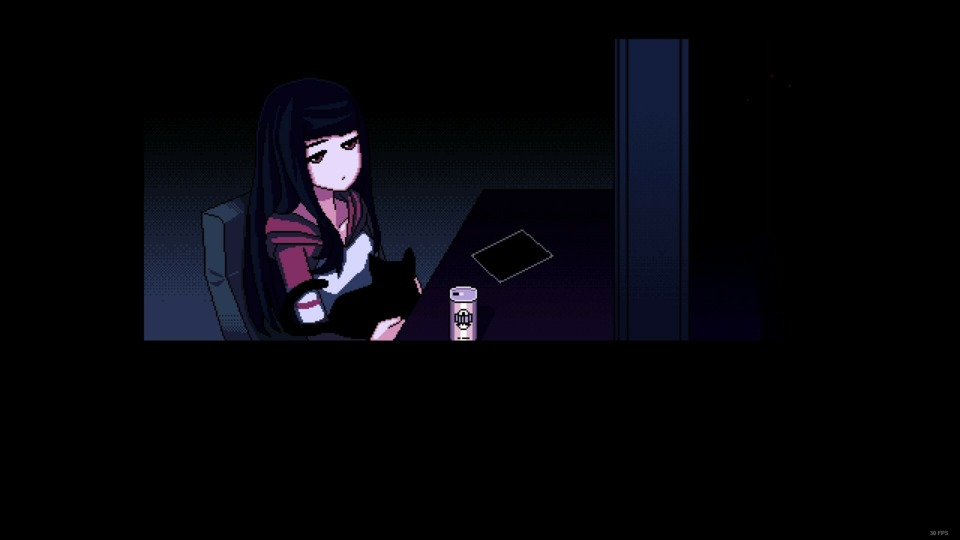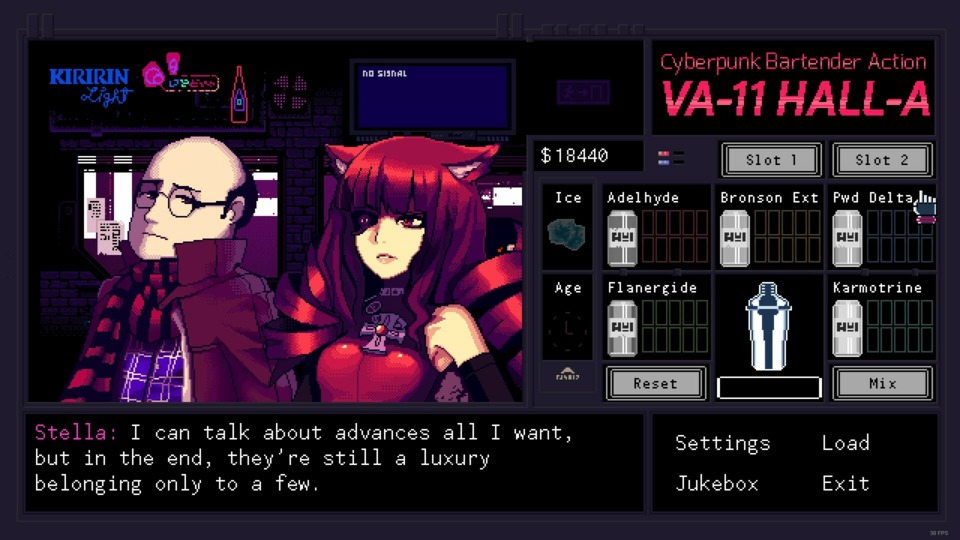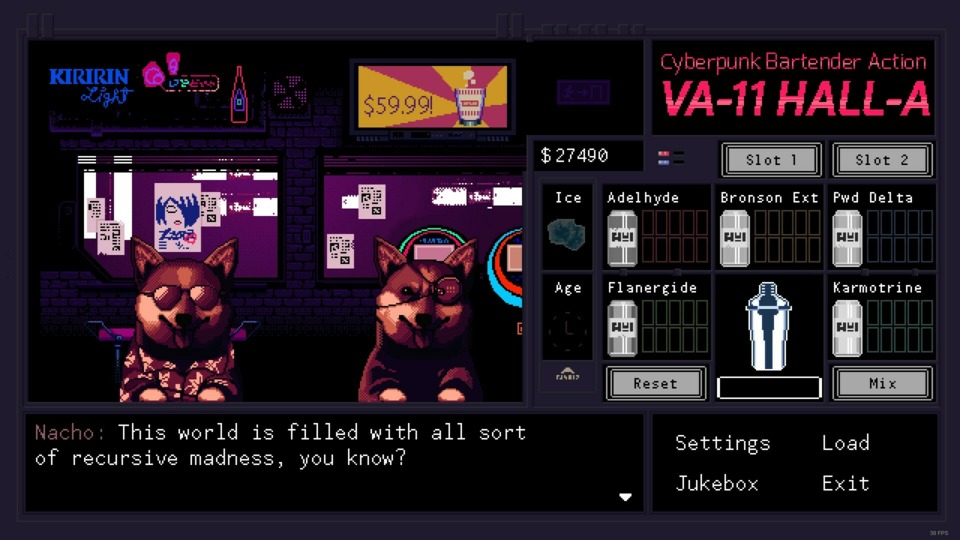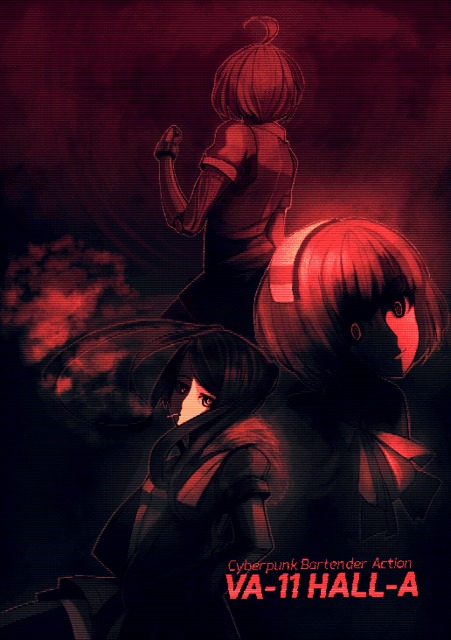Affection Without Romance: An Exploration of Subjectivity and the Emotions that Pull Us Together
Playing VA-11 Hall-A (hereon: VallhallA) around the release of Cyberpunk 2077 is an interesting proposition; we see a similar Cyberpunk world to be explored and two methods of doing so that could not be more different. In the former, we have a hyper-focussed concentration on a small bar just off of the main street in the dystopic Glitch City; in the latter a sprawling open world that takes you up to the very top of top of looming skyscrapers and down below into the ripperdoc dens of Night City. Both have their merits and both are able to enunciate and portray very different aspects of what is ultimately a similar dystopic future.
A note on spoilers: I will not directly spoil any plot major elements without warning, but it is sadly not possible to write any meaningful thoughts interrogating this game without some minor spoilers. Ultimately I think anybody interested in the exploration of relationships and queer lives should try this game.
As VallhallA opens, we are treated to a gorgeous introduction of the tiny bar in which the main protagonist Jill will work from; and it is from her perspective behind this bar we will spend most of the approximately 18 hours it took to finish this game (although some do it in as few as 8-10) interacting with the varied characters and stories presented.
An Understanding of Women's Relationships
One of VallhallA's greatest strengths can be seen in its portrayal and deep understanding of women's relationships. Through Jill, we encounter a variety of male and female clients - all of which are given full agency and a level of depth you would hope for in a universe such as this. But moreso than just "how deep" the characters are, we also see the unique ways in which they interact with Jill - and Jill's placement as a female protagonist never fades into the background of VallhallA. Oftentimes, when games present a female protagonist it can be easy to forget that you are a woman. We see with games like Cyberpunk 2077, Assassins Creed Valhalla and Tomb Raider that dialogue is either written in a gender-neutral manner or that there are some wolf-whistles and comments on appearance and nothing more.
VallhallA presents women and their relationships in a way that seems congruent with Carol Gilligan's key propositions in In a Different Voice. For those unfamiliar it is a work of feminist psychological theory published in 1982 that had a notable impact on the second-wave feminist movement. Crucially we need not agree with all of Gilligan's conclusions, but a notable finding in her studies was the difference in how men and women perceive themselves and the ethical differences that follow from these perspectives. When asked "How would you describe yourself?", Gilligan found that women often refer to themselves in relational and descriptive terms; as lovers, wives, mothers, friends - their identity saw themselves as inter-relational subjects in a shared world. When the same question was posed to men however, the vocabulary was of a more individualistic ilk, describing achievements and accolades by comparison - men saw themselves as isolated individuals in a world of objects to be used toward some purpose.
How this relates to VallhallA can be seen in how men interact with Jill; an early male character is Donovan; Donovan is a balding newspaper editor who speaks of his staff with open contempt but quite enjoys Jill's company. We meet Donovan multiple times throughout the game and at each opportunity we see him expecting something of Jill that is a little extra than just bartending. Whilst common sexual undertones might be present here (the game still does contain those comments on Jill's appearance you would expect), he is often seeking gossip or information from her. And no matter how many times Jill refuses, he persists. Another patron that illustrates this is Art - a private detective. Art is also looking for information and incredibly hesitant to spend money - but after buying a drink for $80 (the cheapest on the menu in this universe) he is astoundingly disappointed that Jill would not offer up gossip or hearsay to him. He continues to spend and expects more, showing his disappointment that Jill isn't providing any extra for his money. Whilst obvious comparisons can be made (and are understood by any woman that has had a stranger offer to buy them a drink) we do not see such overt sexual advances from Donovan or Art; what we see is more how they view Jill. They are not viewing her "as an end in herself" (to quote Kant) worthy of respecting on her own merits, nor as a complete subject - they see her as another object in their world to used towards their own (just) ends.
If we compare this to the women that Jill interacts with, the difference becomes more and more apparent. Alma, another of Jill's patrons is a hacker - their relationship is often teasing and the care for one another is palpable. Alma often describes herself in-line with Gilligan's observations - not as an accomplished hacker (which she is) but as a sister. Whilst never brought to the front of the conversation, we also find out that Alma has a trans-gender brother through an accidental misgendering and near deadname slip - these are handled lovingly though: of a sister that is supportive of their brother but is taking time to adapt to a new way of life. She describes relationships in vivid detail - and not in moralistic right and wrong masculine voice described by Gilligan, but in a feminine voice that assesses harm and the avoidance of it. Throughout all of this Jill's dialogue and monologue show a deep caring for what Alma is going through. Whilst you would be forgiven for assuming this is exclusive to Alma and not a fair comparison to be drawn, we see this with other characters too. Kira Miki (a popstar) has only two to three encounters throughout the 18 hours but those encounters and full the type of feminine dialogue Gilligan brings to light. VallhallA does not show all women as friends - but it does show that women see themselves through lenses of relations and it explores what that really means.

Affection without Romance
Building upon the excellent portrayal of relationships in VallhallA through its uniquely feminine perspective outlined above, it goes deeper in exploring class within the city and the different aspects that bring people together. VallhallA, whilst subtly pointing out issues in patriarchy that exist today, also understands intersectionality - it is a good feminist understanding of intersectionality. Despite the character flaws of revealed through the feminine voice, both the men and the women of VallhallA face a common enemy; the Glitch City government and its social policies. With the exception of Donovan (for fairly obvious reasons - Donovan is a character that on the whole feels out of place - he lacks ironic closeness of a post-modern boss and is very much a relic of an old authoritarian figure of the likes Fromm or Zizek describe that would seem outdated even in modern fiction) all characters are suffering from the almost progressive but highly corrupt policies at play in Glitch City. Whilst their acceptance of Lilims (this fiction's version of a sentient cyborg) in society might be read as acceptance of other races, sexualities and so on, it is made clear against the global backdrop that this is a social experiment and not some progressive cry. Nevertheless, human, Lilim and everything in-between, whilst being oppressed by the same state apparatus re-run the same tired conversations you might expect to hear in any given bar before "the new-normal". Huge tech companies are defended on lines of "ultimately bringing progress to society", with attacks on this position pointing out that whilst that may be the case it is a world in which only the rich can afford them (familiar, anyone?). But it is through these arguments we see intimacy develop between characters; the Cat-Boomer character Stella argues at length and heatedly with Art on technological progress, but they ultimately bond.

Another character exemplifying this friendly intimacy is Dorothy. Dorothy is a Lilim sex worker that is lovingly portrayed and appears in many scenes throughout the game. Dorothy is an intensely likeable character that develops relationships with many of the key cast members. One of the notable relationships is her unexpected development with White Knight (essentially, military police) member Sei. Sei's shyness and Dorothy's energy are beautifully opposed - Sei can recognize the issues perpetuated by the White Knights but turns a blind eye for Dorothy, giving her advice on how to conceal herself better to avoid trouble in future. On paper this might not seem like much, but in context of how devoted a White Knight that Sei is, and how passionate Dorothy is in her work a sex worker, the way the game breaks down the societal barriers between the two portrays hope for a different kind of world.
The crowning moments in which the VallhallA shows understanding of this idea of intimacy between people without falling back on romance are during a portion of the story where Jill is wrestling with loneliness. VallhallA is aware enough not to try and resolve her loneliness through a romantic plot; instead it is resolved through beers on the balcony with her boss, and a night cuddling Dorothy. (For spoiler reasons, I wont comment any further on how this plot develops - but please trust that the way it is handled is satisfying for anyone who, like myself, might be sick of "loneliness until falling love" as a trope fiction these days).
Waifu Culture
Finally, there is a bizarre contrast between how the game treats its female cast and how the surrounding media treats its female characters. Internally, VallhallA offers criticism of "waifu-culture" - the fact that Jill is not a traditionally sexy character is referenced time and time again and the sexist dicourse can be seen in the in-universe version of 4Chan. Whilst we never see Jill's full appearance (only the waist up) she comments in her own dialogue how she is unusual for a bartender in how conservatively she is dressed. In that context, the choice of "waifubartending[dot]com" as a domain name for the game, and the accompanying media portraying her in a tiny mini-skirt with large thighs feels so out of place. In an FAQ on the website, the developers respond to a question on romance-plots saying that "the waifu thing was an epic prank to make people buy the game", but at the same time on the developers website (sukeban[dot]moe) there is an FAQ regarding lewds with the response that they are already done. None of this is a real turn-off; we oftentimes do need to look away from the marketing material and focus only on the text-itself.
It is worth noting however that whilst taking an ironic stance to waifu culture might seem progressive, what the developers and fandom have shown is that this type of ironic distance from sexist cultures just allows us to continue the behaviour 'innocently'. Anyone who has played through VallhallA will clearly pick up its message that fetishizing characters as waifus carries its own set of baggage and problems. The result however, is that the fandom and surrounding media just continues in perpetuating waifu-culture and behaviours with the potential to retort "we don't really mean it, its for the lulz :)", thereby disavowing the sexist tropes it perpetuates on how women ought to look. The reality of marketing a small game like VallhallA makes the objectification of its women cast (and really most notably Jill - it cannot be overstated how much of a disconnect there is there) a sad reality. For anyone who cares about this critique, let us continue to enjoy the game without fetishizing characters and lets treat them as the developed, unique and brilliant people they are. (For more on this, a search for critiques of irony and cynicism might lead to some interesting reading).

Concluding Remarks
There is so much more I would love to discuss here, but for time purposes and spoiler reasons I simply cannot. Even the more dislikable characters throughout the story have depth to be explored. There are many more recurring themes throughout the game too; humanity and what it means to be human is explored through the Lilim cast, sexuality explored with a range of gay, lesbian and bisexual characters -- this cannot be understated either; there are very few bisexual portrayals in contemporary games and VallhallA sets the stage perfectly.
The game has a fantastic set of sound effects and a wonderful OST. Whilst initially, the "choose-your-own-OST" jukebox was novel, I did by the end wish the developers had chosen the music for us. I mostly kept to a quieter moody set of tracks, but at times I would have a character pouring their heart out as the cry into their drink and an upbeat techno track came on. You can skip tracks and move around to a more fitting one, but it is somewhat immersion breaking. Considering the high quality of tracks they had available, its a shame the developers didn't use them a little more deliberately.
I really appreciate anyone who has taken the time to read through my half-developed thoughts on this game and the types of stories it portrays.
